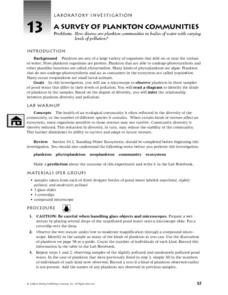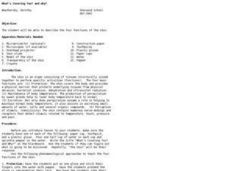Merck KGaA (Darmstadt, Germany)
EMD PTE
You can't tell by the title, but this is a functional periodic table of elements. Incorporating bright colors, lucid text, and easily operated features, this application serves as a valuable reference tool for your chemistry class.
California Academy of Science
Carbon Cycle Role Play
Anytime you make concepts clear with role playing or hands-on experience, it's a win for the whole class. Ping-Pong balls are used to represent carbon in a carbon cycle role-play activity. In small groups, children first discuss what...
Curated OER
Dilution and Concentration of Solutions
Future chemists practice laboratory techniques by creating a monochloramine solution. The objectives are to use of dilution, 9concentration, and measurement skills and to prepare a solution that will be used in a water treatment...
National Institute of Open Schooling
Mole Concept
Learners explore atomic measurement in the first activity in a series of 36. Through readings, activities, and questions, classes review standard SI units, learn about Avogadro's constant, and use it to help them calculate moles. They...
Curated OER
Mountain Pine Beetle
Students identify the different parts of a tree. In this biology lesson, students investigate how mountain pine beetles kill trees. They examine the beetles' anatomy using a microscope.
Curated OER
How Organisms Respond to Changes in their Environment
Students observe the reaction of living cells to mechanical and chemical stimuli by introducing different stimuli to an organism under a microscope and recording the response.
Curated OER
Cells, The Structural and Functional Units of Life
Students observe the general structure and organelles of plant and animal cells. Students prepare microscope slides of elodea, onion, check, and cork and identify the cells by size and shape as unicellular, multicellular, plant or animal.
Curated OER
Unit: Processing and Manufacturing: Examination Three
StudentsMatch the vocabulary terms in column A with the definitions in column B. Write the letter of the definition in column B in the space next to the terms in column A. Afterwhcich, students Write short answers or fill in the blank to...
Curated OER
Pollen Tube Growth
Students demonstrate the proper usage of the compound and dissecting microscopes. They identify the parts of a flower and the functions of the flower parts. Students describe the process of gamete formation and fertilization in a flower.
Curated OER
What Kind of Insect is That?
Fifth graders characterize insects and classify insects according to the Linnaean system. They use hand lenses or microscopes to examine insect body parts.
Curated OER
Cell Observation Exercise
Students take measurements of the distance between the objective and the slide when in focus with each objective. They determine the diameter of the field of view at each power in order to determine the size of the cells being observed.
Curated OER
Measuring the Effect of Adrenaline on the Heart Rate of Zebra Fish
Students investigate the heart beat of zebra fish in timed intervals. They record the heart beats and average three counts to display in their data tables. They repeat these steps increasing the adrenaline solution.
Curated OER
A Survey of Plankton Communities
In this biology worksheet, students identify and define the vocabulary terms listed and make a prediction about the outcomes of the experiment. Then they complete the chart of the observations of the plankton diversity in drops of pond...
Curated OER
Using Magnetotactic Bacteria to Study Natural Selection
Students observe bacteria that are able to orient themselves using the Earth's magnetic field.They comprehend the difference between anaerobic and aerobic organisms. Students can tell the difference of the shape of magnetic force field...
Curated OER
Creating Coacervates
Students create and observe coacervates. In this origin of life lesson, students create coacervates by mixing carbohydrate and protein solutions. They observe the life-like qualities of the structures and discuss the origin of life.
Curated OER
Crime Scene Investigation (CSI) with Powdery Mildew Fungi
Students explore a specific method of identifying fungi, using a written key and an illustrated key. Powdery mildew fungi can be identified to genus by the morphology (appearance) of the sexual stage (cleistothecia).
Curated OER
What's That Brown Fuzzy Stuff on My Plum?
Young scholars use Koch's Postulates to determine that a specific organism is the root cause of a specific disease and identify what Koch's Postulates are within a protocol. They describe symptoms and signs of diseased fruit and isolate...
Curated OER
Cell Types and Parts
Eighth graders, after creating a Venn Diagram comparing/contrasting animal and plant cells, writing ten similes describing cell types, or drawing a colored diagram of a cell, list cell types as well as describe and label cell parts. They...
Curated OER
Temperature Affects The Heart Rate
Young scholars relate heart rate and development to environmental conditions through experiment. In cooperative groups, students record the heart rate in developing zebra fish. Groups create a standard curve to predict the temperature...
Curated OER
Properties of Materials - Part B
Learners describe the history of materials. They use the kinetic (particle) theory to explain changes of state in matter and trace the flow of heat during changes of state and chemical changes.
Curated OER
Comparing Ovaries And Testes
In this reproductive system learning exercise, students compare specimens of rat ovaries and testes. They complete 5 short answer pre-lab questions, follow an 11 step procedure and answer 5 analysis questions.
Biology Junction
Fungi Coloring Worksheet
In this biology instructional activity, students complete 28 short answer questions on fungi. They color and label the different parts of a hyphae.
Curated OER
Air Matters
Students research the affects that particulate matter has on the quality of our air and our health. Students analyze a streaming video on air pollution and complete an internet research assignment to find ways to reduce particulate...
Curated OER
What's Covering You? and Why?
Young scholars take a closer look at human skin. In this biology lesson plan, students describe the four functions of the skin as they complete a hands-on activity.























